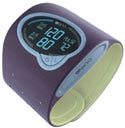$10 Device Enables Interoperability and Wireless Data Transmission
May 1, 2008
NEWS TRENDS
|
This wireless device meets patient and user needs with its low price point and its compatibility to a variety of data management systems. |
An inexpensive wireless system developed by Cambridge Consultants (Cambridge, UK, and Boston) hopes to give patients more control over monitoring their health. It might make for better data compatibility between devices and more-secure transmission of medical data. The product, called Vena, could be available by the end of this year.
The platform is a chip that enables medical devices to wirelessly transmit data. Patients can use the product independently, because medical data are sent to a central monitor located in their home. The platform can also transmit data to online health records such as Google Health, or it can send data using a cell phone.
It has already been successfully tested with a pulse oximeter and with weighing scales. The product has potential applications with blood pressure monitors, glucose meters, thermometers, heart-rate monitors, and peak flow meters.
The device uses inexpensive wireless technology and could be added to a device with hardware that could cost less than $10. “The chip that is used to run Vena is primarily a Bluetooth chip,” says Paul Williamson, head of wireless medical at Cambridge Consultants. “The chip is used in high-volume consumer products. This means that the Vena software can be run on a single chip that benefits from the cost reduction associated with high-volume production.”
The company has seen a strong response to the product, mainly from its device development customers who want to manufacture products that address the home market.
“We can expect to see the Vena platform applied to a wide range of health devices, and as our images show, we expect to see range of consumer-focused medical devices,” says Williamson.
The chip implements the IEEE 11073 standard, which establishes data compatibility between devices, and the Bluetooth Medical Device Profile. The Bluetooth profile enables secure transmission of medical data.
Combining the emerging IEEE and Bluetooth standards onto one chip is a unique aspect of the technology. “The software has the capability to run both standards, as well as the UI [user interface], display and keys, and [it can] read sensor data,” says Williamson. “This means that a single chip can be used as the basis for a complete wireless medical device.”
According to Williamson, current Bluetooth medical products on the market don't use the Bluetooth standard and thus are proprietary to one manufacturer. “Vena provides an opportunity for manufacturers to produce connected medical devices, which connect to services, to deliver greater value,” he says.
The device also incorporates transmission control protocol for Wi-Fi or Ethernet connections and can be connected via cables.
Copyright ©2008 Medical Device & Diagnostic Industry
About the Author(s)
You May Also Like


.png?width=300&auto=webp&quality=80&disable=upscale)
